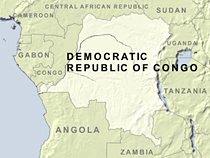A military court in Democratic Republic of Congo has acquitted three former employees of Australian mining company Anvil Mining Limited of complicity in war crimes by government soldiers in 2004. Judges said the charges against the miners and nine Congolese soldiers were unfounded. Joe Bavier is in the capital, Kinshasa, and has more for VOA.
Canadian Pierre Mercier and South Africans Peter Van Niekerk and Cedric Kirsten had been accused of willfully offering logistical assistance to Congolese soldiers during a short-lived armed uprising in mineral-rich Katanga province.

A U.N. human rights investigation said civilians were massacred in the town of Kilwa, near the southeastern border with Zambia, when government forces launched a counter-attack to retake the town after it had been seized by a group of 10 ill-equipped rebels in October 2004.
The Anvil company runs the nearby Dikulushi silver and copper mine and the company's trucks and planes were used by the army during the operation.
Anvil said its vehicles were requisitioned by the military and it had no choice but to hand them over.
Van Niekerk, former security director at Dikulushi, and Mercier, Anvil's country manager at the time of the uprising, both returned to Congo to stand trial. Kirsten, believed to have been out of the country during the uprising, was judged in absentia.
All nine Congolese soldiers also on trial before the military tribunal were acquitted of war crimes. But two officers received life in prison for the killing of civilians; two other soldiers received shorter sentences for lesser crimes.
Anvil CEO Bill Turner said in a statement that he was pleased the court had cleared the men, who the company has always maintained acted appropriately at the time.
Congo is still emerging from a 1998-2003 war in which rebel groups and foreign armies battled for control over the vast central African nation's abundant natural resources.
An estimated four million people perished during the conflict, mainly from hunger and disease. And parts of the country continue to suffer outbreaks of violence, despite a U.N.-backed peace process and polls last year that elected President Joseph Kabila as Congo's first democratically chosen leader in four decades.
Unlike neighboring Rwanda, which launched a tribunal in Arusha, Tanzania, to judge those responsible for the country's 1994 genocide, Congo has made little effort to shed light on the dark events of its recent history.
Many had hoped the trial of the miners and soldiers, which received logistical support from Congo's U.N. peacekeeping mission, would help put an end to the climate of impunity that still reigns in the country.
Human rights campaigners decried the replacement of the court's military prosecutor in February, claiming they feared the move was a sign of political meddling. And victims' supporters said they were disappointed by the trial's outcome.
Shortly after reading the verdict human rights lawyer George Katiamba, who represented the victims and their families during the six-month trial, said he hoped the case could be brought before the International Criminal Court in The Hague.
Related articles
- • Felix Tshisekedi Sworn In as DR Congo President (January 24, 2019)
- • Constitutional Court Declares Tshisekedi Winner of Presidential Election (January 19, 2019)
- • Felix Tshisekedi Vows to Be the President of All Congolese (January 10, 2019)
- • Felix Tshisekedi Elected DR Congo President (January 10, 2019)
- • DR Congo Delays Results of December Election (January 6, 2019)
- • Moise Katumbi blocked from entering DR Congo (August 3, 2018)
- • Botswana Urges Joseph Kabila to Step Down (February 26, 2018)
- • No elections in DR Congo in December without electronic voting machines: INEC (February 13, 2018)
- • US Warns DR Congo Against Electronic Voting for Delayed Election (February 12, 2018)
- • Felix Tshisekedi accuses INEC of illegally prolonging Kabila's mandate (October 24, 2017)
- • DRC Seeks Arrest of Presidential Candidate Moise Katumbi (May 19, 2016)
- • Papa Wemba Is Buried in Kinshasa (May 4, 2016)
- • Papa Wemba Awarded Highest National Honor as Thousands Pay Tribute (May 2, 2016)
- • Rights Groups: DR Congo Must Free Pro-democracy Activists (April 13, 2015)
- • Police Open Fire on Crowd Protesting Election Law Change (January 19, 2015)
- • Etienne Tshisekedi Evacuated to Belgium for Medical Treatment (August 16, 2014)
- • Kerry Calls on Kabila to Honor Constitution (May 4, 2014)
- • Kerry in DR Congo for Security Talks (May 3, 2014)
- • At least 60 killed as train derails in Katanga province (April 23, 2014)
- • DR Congo Takes Chairmanship of COMESA at Summit in Kinshasa (February 26, 2014)
- • DR Congo Honors Nelson Mandela, Hero and Model for Humanity (December 6, 2013)
- • Kabila Congratulates Congo Army for Defeating M23 Rebels (October 30, 2013)
- • DR Congo Eases Process for Starting a New Business (June 3, 2013)
- • Regional Leaders Sign DR Congo Peace Deal (February 24, 2013)
- • The M23 Rebels Want to Overthrow Kabila? Nonsense (November 28, 2012)
- • Protests Against M23 Rebels, Government and UN Spread (November 22, 2012)
- • Thousands Protest M23 Capture of Goma, Turn on Government and UN (November 21, 2012)
- • DR Congo Officials Vow to Defend Goma Against M23 Rebels (November 19, 2012)
- • At high-level meeting, Ban urges political solution to crisis in eastern DR Congo (September 27, 2012)
- • US Cuts Military Aid to Rwanda Over Support to Rebels in DR Congo (July 21, 2012)







